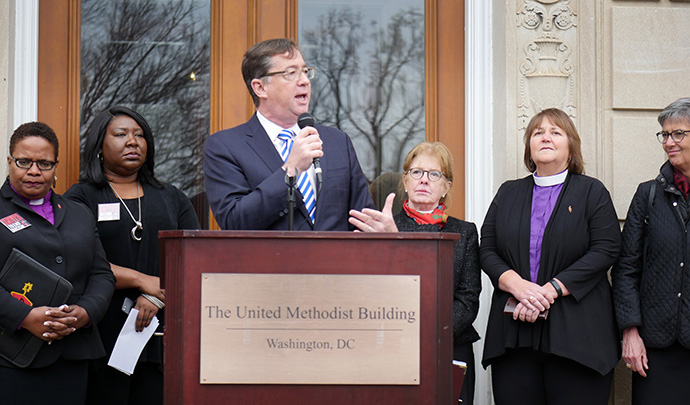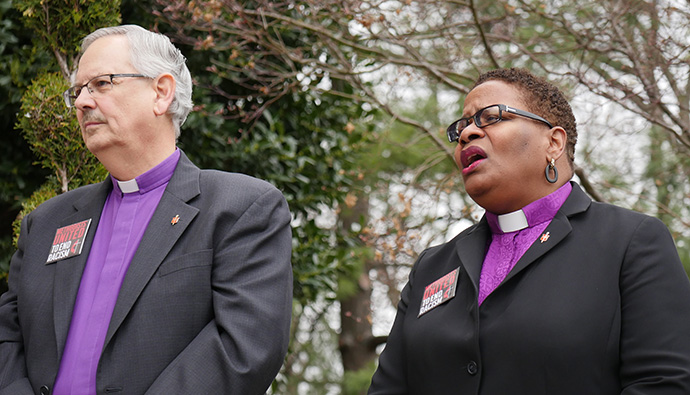Racism is still “rearing its ugly head” in the 50 years since the assassination of the Rev. Martin Luther King Jr., but nothing is a match for the God we love, Bishop LaTrelle Easterling said.
Easterling, episcopal leader of the Baltimore-Washington Conference, was one of several United Methodist leaders who spoke April 3 outside the United Methodist Building, on the eve of a rally expected to draw thousands to the nation’s capital in an event sponsored by the National Council of Churches.
Jim Winkler, president of the National Council of Churches and a United Methodist, said the rally launches the council’s Truth and Racial Justice Initiative which vows a multi-year effort to eradicate racism in the United States.

Jim Winkler, president of the National Council of Churches and a United Methodist, spoke to a gathering of United Methodists on April 3 outside the United Methodist Building in Washington. Photo by Kathy L. Gilbert, UMNS
“We are re-committing ourselves as a faith community to end the scourge of racism that afflicts our nation. We will never move forward as a nation until we end racism,” he said.
Bishop Bruce R. Ough, president of the United Methodist Council of Bishops, talked about the stormy night in 1968 when King was assassinated. Before he died, he preached about the need to always “go on anyhow,” Ough said.
“The Rev. Martin Luther King Jr. did not come preaching something new. He came shouting something we already knew but failed to live,” Ough said.
Easterling added that King was answering God’s call. “He was murdered because of the color of his skin and because he had the audacity to call this nation to account,” Easterling said.
“We have made great strides. I love this nation,” she said. “But we have so much ground yet to cover.”
Easterling spoke of her own historic election as a bishop in The United Methodist Church. She was the second African-American woman elected a bishop in the Northeastern Jurisdiction. She is the first woman bishop to lead the 233-year-old Baltimore-Washington Conference.
Those are marks of progress, she said.
“But when it is acceptable to be openly engaged in and support white supremacy without concern for backlash, that is regression,” she added.
Erin Hawkins, top executive of the United Methodist Commission on Religion and Race, welcomed groups of United Methodists who have come to Washington for the rally.

United Methodist Bishops Bruce R. Ough and LaTrelle Easterling spoke at a prayer witness on the eve of a national rally to end racism. Photo by Kathy L. Gilbert, UMNS
“In a couple weeks we will be celebrating 50 years of The United Methodist Church. In 1968, the church faced a pivotal moment and decided who it wanted to be,” she said. But, she added, the church has not always made the best choices. She cited the earlier creation of the Central Jurisdiction, which segregated African-American Methodists from white Methodists.
“But I believe God is showing up again in this critical time as we are hearing from the tops of power that people with black and brown skins are less. Even in our church, which way will we turn? Will we turn toward unity, for love of all people?”
She urged those who came for the rally to renounce racism and to take that message home.
“As you come to D.C. to be in solidarity, the work is not just for Congress — take it home in your state, city, block, in your homes,” she said.
“This is our work. Let’s get to it.”
Busloads of United Methodists are coming to Washington for the rally on April 4, the anniversary of King’s assassination, including members from the North Carolina, Missouri, Eastern Pennsylvania, Peninsula-Delaware and West Virginia conferences.
Many were at the United Methodist Building and heard from members of the United Methodist Board of Church and Society and General Commission on Religion and Race about the work the agencies do to fight racism.
The United Methodist Building stands across the street from the U.S. Supreme Court and also houses the offices of the Council of Bishops.
On April 4, a silent prayer walk will start at 7 a.m., followed by an interfaith service and a day-long rally and call to commitment.
Gilbert is a multimedia reporter for United Methodist News Service. Contact her at 615-742-5470 or [email protected]. To read more United Methodist news, subscribe to the free Daily or Weekly Digests.
Like what you're reading? Support the ministry of UM News! Your support ensures the latest denominational news, dynamic stories and informative articles will continue to connect our global community. Make a tax-deductible donation at ResourceUMC.org/GiveUMCom.




